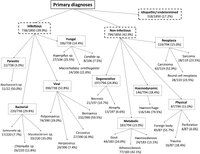Mizzely
Lil Monsters Bird Toys
Super Moderator
Vendor
Avenue Veteran
Celebirdy of the Month
Mayor of the Avenue
Avenue Spotlight Award
Avenue Concierge
TAILGATING
Cutest Bird Ever!!!
Banner Hoarder
There are so many things that could equal more cancer diagnosisit makes me wonder if there is a pellets diet influence with cancer.
In my career long long ago ...I participated in thousands of necropsy of birds, and thousands of x-rays....cancer was beyond rare i think only seen a couple of times .
In a conversation with my veterinarian she mentioned how she is seeing so much more cancer.
And seeing this thread and the number of members whose had cancer in their birds....
It just makes me wonder....and I know when I was active in the field pellets were rare, just really starting to be marketed... there bound to be other candidates leading to increase cancer diagnosis ( outside of budgies who've had a history as species of higher incidences)
This is just me wondering....I'm not trashing pellets. They have a lot to offer. And avian pellets are continuing to be refined and improved ( I hope) as avian medicine, health, and popularity increases. I feed pellets, tho probably as a smaller portion of my diets, as I try to focus on fresh.
Better screening
More people getting birds vet care than they used to
Longer lives which would equal more chances for cancer
Or perhaps something in our homes. Or genetics. Or more birds in homes in general.
I am not saying pellets are perfect, or that they could be blameless, but pellets would not be the first thing I would personally blame.


